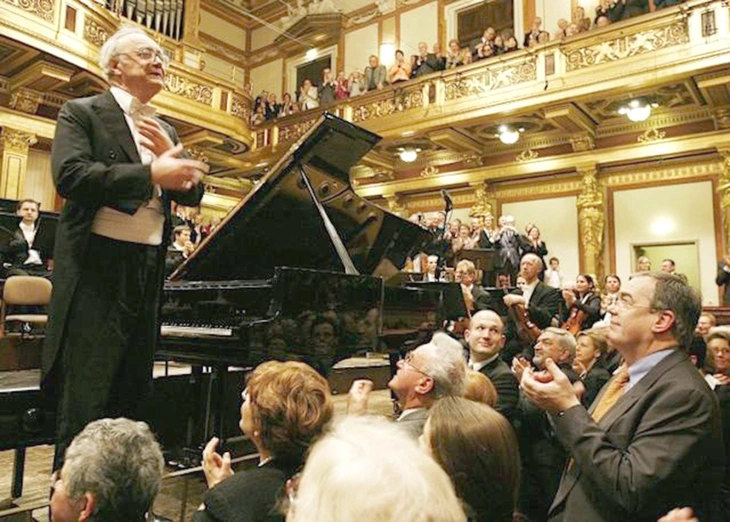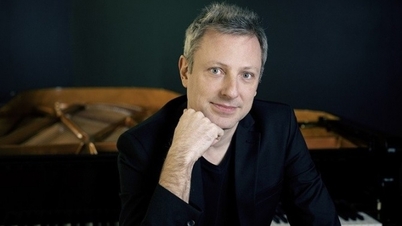
Austrian pianist Alfred Brendel died at the age of 94. This is a photo of his last performance in Vienna in December 2008 - Photo: AFP
He is said to be the first pianist to record Beethoven's complete solo piano works. But he himself says he is not.
He did not record them all. He omitted some pieces that he thought could have been produced by his contemporaries or by students who were practicing composition without Beethoven.
Digging up the humor
There are probably not many people who dare to "criticize" Beethoven. But there are certainly even fewer who dare to interpret Beethoven's works in his later years as "a collection of humorous aspects of music".
Brendel might remind us of a musical Milan Kundera, for like Kundera he devotes a scholarly and intellectual attention to laughter, to nonsense, to triviality.
In Testaments Betrayed, Kundera argues that the emergence of the first novelists is linked to the invention of humor.
So is Brendel, who always finds hidden humor in seemingly serious music in the most serious field, classical music.
He saw in Haydn "the master of daring and surprise". He saw in Beethoven frivolity and mischief.
With Für Elise, for example, Beethoven's lyrical, passionate, yet somewhat dramatic bagatelle, under Brendel's fingers, seems playful and witty.
But the music of Mozart, whom we often think of as the most frivolous and cheerful, Brendel says is not humorous at all.
In a lecture on the non-seriousness of classical music, Brendel quoted a maxim from Pliny the Younger: "I laugh, I joke, I play, I am a man." It seemed to imply that if you learn to laugh, you will learn to joke, you will learn to play (the piano), and you will become a man.
Beethoven - Piano Sonata No. 32 - Alfred Brendel
The most refreshing laughter
Brendel did not play music until his last breath. Before he turned 80, he said goodbye to music. When he said goodbye to music, he said that concerts were becoming more and more difficult for him, but "I still laugh - not as much as before, but enough to survive".
In his house hung a painting of a pianist laughing hysterically, surrounded by an attentive and tense audience. We think of entering a theater as entering a cathedral, we bring all our solemnity to respectfully bow our heads to the music as if bowing to a god, and the artist is a prophet preaching to us on behalf of the god.
But who knows? Who knows, maybe the artist, like Brendel, is actually secretly teasing, secretly laughing at the music, and it's just us who think everything in the theater is serious.
Alfred Brendel has just passed away at the age of 94. In addition to being a pianist, Alfred Brendel was also a great essayist on art and a poet with his own mark.
In a poem about the afterlife, Brendel imagines that people can redeem themselves after death: "Beethoven, for example,/ could be redeemed on the other side/ as a baker/ throwing dough into the oven with a rage that has become familiar."
He humorously compared the master's sonatas to pretzels, and his Bagatelles to poppy seed buns.
And what about Brendel? Now that he's gone to the other side, how will he "redeem" his life? We don't know, but whatever he becomes besides a pianist, he'll probably do it with the best of laughs.
"It seems to me that there is little point in rescuing from oblivion works that are completely devoid of Beethoven's genius and originality," Alfred Brendel wrote in a long essay on his interpretation of the German composer.
Source: https://tuoitre.vn/nghe-si-duong-cam-cua-tieng-cuoi-20250622093751193.htm
























































![[Maritime News] Wan Hai Lines invests $150 million to buy 48,000 containers](https://vphoto.vietnam.vn/thumb/402x226/vietnam/resource/IMAGE/2025/6/20/c945a62aff624b4bb5c25e67e9bcc1cb)














![[Infographic] Party Committee of the Ministry of Culture, Sports and Tourism: Marks of the 2020 - 2025 term](https://vphoto.vietnam.vn/thumb/402x226/vietnam/resource/IMAGE/2025/6/22/058c9f95a9a54fcab13153cddc34435e)
























Comment (0)